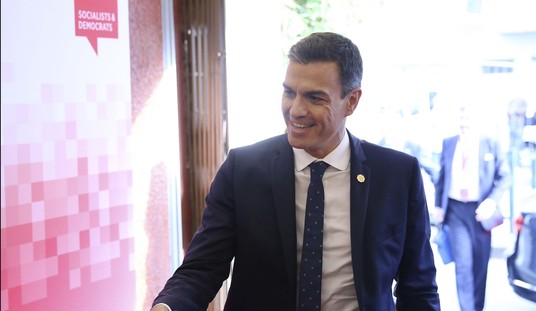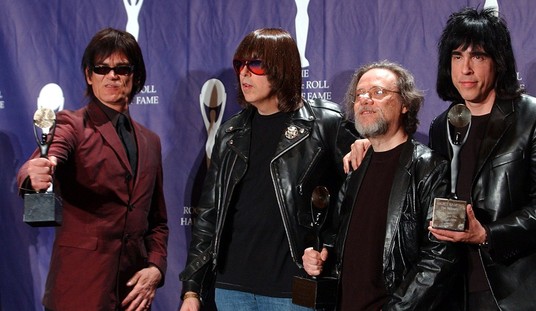In researching our culture of outrageous outrage, Guy Benson and I found a bright spot while writing “End of Discussion”— comedians. Comedians (certainly not all but many) chafe at the imposition of speech codes because the nature of their work is to test new formulations, new jokes, new concepts, live on stage in front of people. If all of those people are armed with video cameras and the constitutions of Austenian heroines in a rainstorm, there is no such thing as comedy. They’re learning that and they’re willing to point it out. That’s a step in the right direction.
There’s a whole chapter in “End of Discussion” devoted to these battles called, “The Uptight Citizens Brigade.” We applaud Joan Rivers for her genuinely unapologetic approach to comedy. We highlight the ludicrous spectacle of the outrage industry going after the famous drinking card game, “Cards Against Humanity,” for a card that was offensive even though the entire reason for the card game’s existence and every card in it is EXPLICITLY TO OFFEND.
Jerry Seinfeld has gotten a lot attention this week for declaring college campuses exactly what they are— bastions of ostentatious sensitivity and insularity.
“I hear that all the time,” Seinfeld said on The Herd with Colin Cowherd. “I don’t play colleges, but I hear a lot of people tell me, ‘Don’t go near colleges. They’re so PC.’”
Seinfeld says teens and college-aged kids don’t understand what it means to throw around certain politically-correct terms. “They just want to use these words: ‘That’s racist;’ ‘That’s sexist;’ ‘That’s prejudice,’” he said. “They don’t know what the f—k they’re talking about.”
The funnyman went on to recount a conversation he and his wife had with their 14-year-old daughter, which he believes proved his point.
“My wife says to her, ‘Well, you know, in the next couple years, I think maybe you’re going to want to be hanging around the city more on the weekends, so you can see boys,’” Seinfeld recalled. “You know what my daughter says? She says, ‘That’s sexist.’”
Leno said much the same in March:
He said: ‘College kids now are so politically correct. I mean, to the point where — I’ll give you an example, we had interns at the show, college interns.
‘Like, the last year of the show, one of the interns comes and says, “Mr. Leno, I’m getting lunch. what do you want?’ I said, ‘I don’t know, where are you going?’
‘He said, “we’re getting Mexican.” I said, “I don’t really like Mexican.” He goes, “whoa, that’s kind of racist”.’
Leno then shouts: ‘That’s not racist.’‘No, being anti-guacamole is not racist, okay? You have no idea what racism is. That’s not racist, you idiot, you moron.’
This is the part of the “End of Discussion” project that gave me hope. Americans don’t like having their fun stripped from them. Even Millenials steeped in this stuff look around every once in a while and realize they can’t get Chris Rock or Jerry Seinfeld to play their campuses anymore, despite the $63K a year they’re forking out for such privileges. And, comedians—most of them liberals in good standing— increasingly are ready to push back on the outrage culture.
All the guys above are white dudes, which allows liberals to say, “Hey, aren’t you a white male? I think that’s enough out of you. End of Discussion.” But our book also highlights the battles of SNL’s Michael Che and “The Mindy Project’s” Mindy Kaling, who have stared down the outrage with good humor and smarts.
This week, SNL alum Colin Quinn has a book out, whose theme I’m loving. The title alone from a white guy is a little ballsy: “The Coloring Book: A Comedian Solves Race Relations in America.” Quinn takes issue with Seinfeld in the same way I do. He’s only diagnosing a small part of the problem:
“Look, for 20 years college students have been too politically correct,” Quinn noted. But here is where Seinfeld and Quinn part company. Quinn believes that this PC mindset has expanded from colleges to American society as a whole in recent years. “Now people are outraged over any ‘buzzword’ that they think is offensive which has led to George Orwell version of ‘groupthink’ that demands conformity.”
Quinn noted that “while the language is being sanitized, feelings haven’t changed. And that is the problem with the ‘groupthink’ mentality where we can’t say certain things because some will be offended.” He added: “We should be more outraged over racist behavior, not over a joke about race that is clearly not intended to demonize any group but to raise issues about the racial divide.”
His frank observations in his book about his own upbringing among all ethnicities and religions in New York will no doubt be flagged by the perpetually offended over and over. And, he’ll say tell them he doesn’t care. Good. More of that. By the way in true Salon fashion, they put this headline on Quinn’s segment with Fox & Friends this morning: “Colin Quinn rebukes Jerry Seinfeld’s P.C. police theory — much to the disappointment of ‘Fox & Friends'”
Watch to see how off that characterization of the exchange is:
While I do agree with you that college students today are more sensitive to issues of race and gender politics, it’s simply because that’s our job as learners. As college students who are engaged in a myriad of social, economic, and political issues, it’s our duty to be actively engaged and educated about issues of sexism, racism and prejudice. While, respectively, your daughter might not quite know what’s considered “sexist” yet, I can say with confidence that most college students can distinguish the boundaries of what’s considered appropriately sexist or not.
But, I’d like to refocus the conversation to the state of comedy that you feel like we would call “racist” or “sexist.”
We need to talk about the role that provocative comedy holds today in a progressive world.
It isn’t so much that college students are too politically correct (whatever your definition of that concept is), it’s that comedy in our progressive society today can no longer afford to be crass, or provocative for the sake of being offensive. Sexist humor and racist humor can no longer exist in comedy because these concepts are based on archaic ideals that have perpetrated injustice against minorities in the past.
Provocative humor, such as ones dealing with topics of race and gender politics, can be crass and vulgar, but underlying it must be a context that spurs social dialogue about these respective issues. There needs to be a message, a central truth behind comedy for it to work as humor.
This college student is happy to be occasionally offended by provocative humor, he says, but only if it adheres to a proper underlying social message he approves. Have fun!
Previously: Thought crime averted just in time!








Join the conversation as a VIP Member